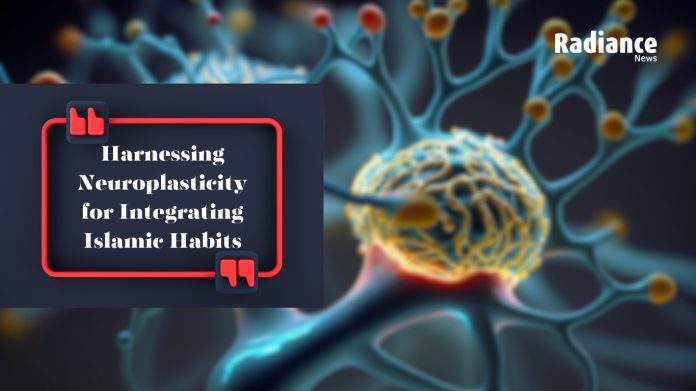Neuroplasticity invites us to consciously shape our Islamic habits, leveraging the brain’s capacity to adapt and grow throughout our lives. This journey is not just an individual pursuit but a collective one, where parents play a pivotal role in instilling values and fostering resilience in the next generation.
– Shariqa Nida
In our fast-paced and ever-evolving world, navigating the complexities of modern life often brings about unprecedented challenges. From the constant influx of information to the pressures of societal expectations, individuals find themselves amidst a dynamic landscape that demands adaptability and resilience. It is within this context that we delve into the extraordinary capabilities of the human brain and the profound concept of neuroplasticity. As we grapple with contemporary issues, the exploration of how our brains adapt and grow becomes not just a scientific endeavor but a practical and empowering tool for personal development.
Neuroplasticity, the brain’s ability to rewire and reshape itself, emerges as a beacon of hope, offering insights into enhancing our cognitive, emotional, and spiritual well-being. In this article, we unravel the wonders of neuroplasticity and its implications, particularly within the framework of Islamic habits, shedding light on how understanding this phenomenon can be transformative in addressing modern challenges.
The Marvel of Neuroplasticity in Islamic Development
Our understanding of neuroplasticity transforms the narrative of Islamic habits from routine practices to profound pathways of cognitive and spiritual growth. Neuroplasticity, defined as the brain’s ability to adapt and reorganize, serves as the underlying force shaping our responses to the experiences encountered in our journey of faith.
Extensive research in neuroscience and psychology during the last decade has uncovered fresh perspectives on how our brains and behavior evolve in reaction to experiences. This body of work consistently points to one clear idea: the brain is not fixed but continually adapts, undergoing changes throughout our entire lives. It reveals that neural networks are not static but rather dynamically form and dissipate based on our experiences throughout our lives.
At its core, neuroplasticity is influenced by learning and repetition. Engaging in a particular habit triggers neuroplastic changes in our brain, reinforcing neural pathways with each repetition. Whether it’s the consistent performance of certain movements, the memorization of verses, or habitual practices, such repetitive engagement shapes the brain’s architecture.
Consider Salah, it involves intricate movements and recitations. Repeated practice fortifies neural connections, facilitating the automatic execution of these actions. This repetitive engagement leads to the brain creating robust associations between specific cues and desired behavioral patterns.
Neuroplasticity isn’t solely about mastering actions – it’s equally intertwined with emotional engagement. Engaging in Islamic habits with devotion and a sense of spiritual fulfillment reinforces these actions within the brain, embedding the habits deeper within one’s psyche.
Moreover, neuroplasticity is adept at rewiring the brain’s reward pathways. Consistent practice of Islamic habits instills a sense of spiritual contentment and peace. As a result, the brain strengthens the connection between these habits and positive emotions, reinforcing the desire to perpetuate these practices.
The integration of Islamic habits within specific contexts is another fascinating aspect influenced by neuroplasticity. For instance, Salah is associated with the call to prayer, ablution, and the sacred space of a mosque. Similarly, fasting during specific hours requires mental preparation to control biological impulses throughout the day. Reading the Quran at dawn, for instance, or associating specific chapters with Tahajjud prayers exemplify how habits become linked with particular moments. Acts of kindness, such as charity or aiding others, are deeply rooted in the belief of accruing good deeds.
Similarly, abstaining from certain actions is linked to the fear of displeasing God. These Islamic habits become entwined with specific times, places, and social interactions, creating strong associations that prompt their performance in these specific contexts.
Neuroplasticity’s greatest asset lies in its adaptability. Individuals striving to incorporate new Islamic habits witness the brain’s plasticity facilitating adaptation. Over time, the brain adjusts to these practices, seamlessly integrating them into one’s daily routine.
Cultivating Islamic Habits: A Neuroplastic Approach for Parents
Understanding neuroplasticity transcends individual growth; it becomes a potent tool for parents navigating the complexities of raising children in an ever-evolving world. By realizing that repetition and emotional engagement reinforce neural pathways, parents can intentionally craft experiences that instill a deep connection to Islamic values. The immersive environments they create expose children to a rich tapestry of Islamic practices, teachings, and values, fostering cognitive, emotional, and spiritual growth.
In the intricate dance of modern existence, where challenges abound and societal expectations loom large, neuroplasticity emerges as a transformative ally. As we unravel the mysteries of our brain’s adaptability, we find not only a scientific phenomenon but a practical guide for personal and spiritual development.
Neuroplasticity invites us to consciously shape our Islamic habits, leveraging the brain’s capacity to adapt and grow throughout our lives. This journey is not just an individual pursuit but a collective one, where parents play a pivotal role in instilling values and fostering resilience in the next generation. In understanding and embracing neuroplasticity, we equip ourselves not only to confront contemporary challenges but to cultivate a future deeply rooted in Islamic values and personal well-being.
[The writer is Post Graduate in Psychology from the Central University of Hyderabad]




